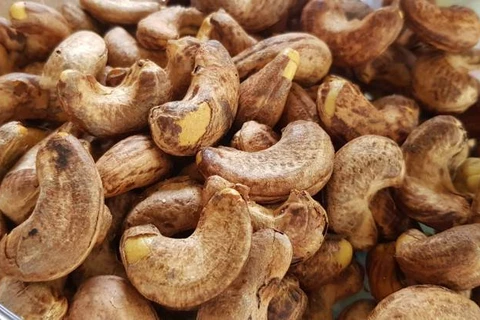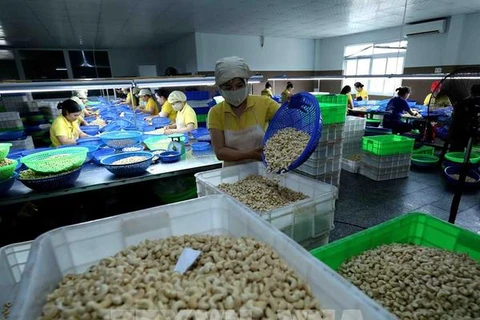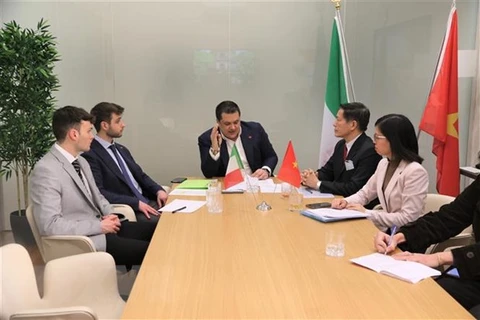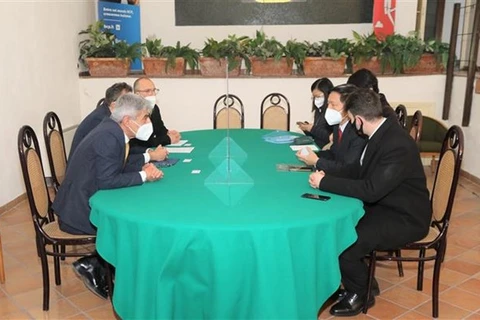Hanoi (VNA) – The Ministry of Industry and Trade (MoIT) has stepped in to help Vietnamese cashew nut exporters handle the suspected scam in Italy.
The MoIT has ordered the Vietnamese Trade Office in Italy to pay fact-finding visits to the ports of Genova and Napoli where cashew nut consignments from Vietnam arrived at and discuss with the port operators and local authorities as well as concerned shipping lines and banks.
The trade office has requested the carriers to temporarily halt the release of the goods until the case is brought to light. Additionally, it has helped the Vietnamese exporters seek consultation from Italian lawyers and take legal steps to gain control of the consignments.
The Trade Office of Vietnam in the US, meanwhile, has contacted the broker to request for information and cooperation in the probe into the case.
The ministry has also asked for help from the Embassy of Italy in Vietnam as well as the Italian Minister of Foreign Affairs and International Cooperation and Minister of Economy and Finance to promptly settle the case, thus protecting legitimate rights of Vietnamese exporters and reputation of Italian firms.
Furthermore, the ministry recommended exporters to double-check their overseas partners via different sources of information, including Vietnamese trade offices in foreign countries, and take risk management measures like insurance.
Vietnamese exporters are at risk of losing hundreds of millions of USD in the suspected cashew nut scam in which they have not received any payment as agreed for the shipment of 100 containers of cashew nuts to Italy.
As of late March 9, 36 containers' original documents, required by shippers to release the containers, have gone missing and Vietnamese exporters have not yet received payment for their goods. Some containers have arrived in Italy while others are on the way.
Several exporters have reported that changes were made to the SWIFT code sent from Vietnamese banks to those allegedly representing the importer in Turkey. The Turkish banks said the buyer is not their client and said they had sent back the documents. However, they failed to specify how they had sent back the original documents and have not provided Vietnamese banks with bills of lading.
After document collections were sent to the buyer’s bank in Italy, the Italian bank replied that it had received only copies of the bills of lading, not the original documents. Therefore, they cannot process the payments. It is the norm in international trade that anyone with the original documents can collect the goods and the shippers must comply./.
The MoIT has ordered the Vietnamese Trade Office in Italy to pay fact-finding visits to the ports of Genova and Napoli where cashew nut consignments from Vietnam arrived at and discuss with the port operators and local authorities as well as concerned shipping lines and banks.
The trade office has requested the carriers to temporarily halt the release of the goods until the case is brought to light. Additionally, it has helped the Vietnamese exporters seek consultation from Italian lawyers and take legal steps to gain control of the consignments.
The Trade Office of Vietnam in the US, meanwhile, has contacted the broker to request for information and cooperation in the probe into the case.
The ministry has also asked for help from the Embassy of Italy in Vietnam as well as the Italian Minister of Foreign Affairs and International Cooperation and Minister of Economy and Finance to promptly settle the case, thus protecting legitimate rights of Vietnamese exporters and reputation of Italian firms.
Furthermore, the ministry recommended exporters to double-check their overseas partners via different sources of information, including Vietnamese trade offices in foreign countries, and take risk management measures like insurance.
Vietnamese exporters are at risk of losing hundreds of millions of USD in the suspected cashew nut scam in which they have not received any payment as agreed for the shipment of 100 containers of cashew nuts to Italy.
As of late March 9, 36 containers' original documents, required by shippers to release the containers, have gone missing and Vietnamese exporters have not yet received payment for their goods. Some containers have arrived in Italy while others are on the way.
Several exporters have reported that changes were made to the SWIFT code sent from Vietnamese banks to those allegedly representing the importer in Turkey. The Turkish banks said the buyer is not their client and said they had sent back the documents. However, they failed to specify how they had sent back the original documents and have not provided Vietnamese banks with bills of lading.
After document collections were sent to the buyer’s bank in Italy, the Italian bank replied that it had received only copies of the bills of lading, not the original documents. Therefore, they cannot process the payments. It is the norm in international trade that anyone with the original documents can collect the goods and the shippers must comply./.
VNA
























